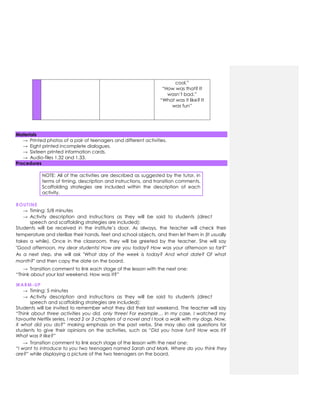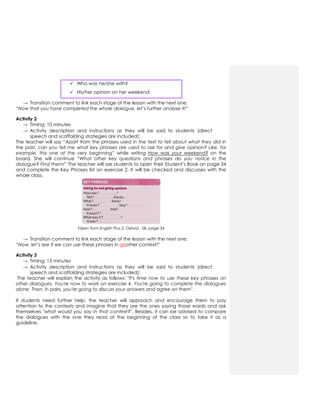This document provides a lesson plan for an English class focused on discussing past experiences. The plan includes:
- Warm-up activities where students recall activities from their last weekend and ask each other opinions using past tense verbs and phrases.
- A presentation where students look at photos of past activities and practice guessing and speculating about what two teenagers did over the weekend.
- Development activities where students complete dialogues about weekend plans, identify key phrases for discussing opinions, and then discuss their own weekend experiences in pairs using these language functions.
![I.S.F.D LENGUAS VIVAS BARILOCHE
PRÁCTICA DOCENTE III
ENTREGA DE PLANIFICACIÓN
ALUMNA PRACTICANTE: Valeria Zentner
Institución educativa: Charles Dickens Institute
Año y sección: Second Junior - Única Sección
Nivel lingüístico del curso: Elementary
Cantidad de alumnos: 8
Tipo de Planificación: Clase
Unidad Temática: The Past
Clase Nº:
Duración de la clase: 90 minutos
Fecha de la clase: Thursday, June 24th
Fecha de entrega de la planificación: May 30th
Learning Aims
During this lesson, learners will be able to…
→ Revisit Past Verbs and grammar structures.
→ Learn, understand and use key phrases to ask for and giving opinions.
→ Gather information from photos and make deductions collaboratively.
→ Improve speaking and listening skills by exchanging information on past experiences.
Language Focus
LEXIS FUNCTIONS STRUCTURE
R
E
V
Regular and Irregular
verbs in the past:
came, ate, explored,
felt, found, got, gave,
went, had, helped, left,
looked, met, saw,
stayed, took, travelled,
visited, watched
To talk about past
events and actions.
Simple Past structures
“I went back to the
17th century”
“I visited William
Shakespeare”
“I didn’t go to the
theatre”
“Did you…?”
“What/Where/Who
did X…”
N
E
W
To ask for and give
opinions.
Key phrases to ask for
and give opinions on
past events:
“How was your
weekend? Not bad,
thanks.”
“What do you think? It
looks great! Very
Comentario [A1]: Quite abstract…](https://image.slidesharecdn.com/piii-du1lesson4-zentner-pass-210707210335/75/DU1-The-Past-Lesson-4-1-2048.jpg)


![Students will be given a copy of an incomplete dialogue each. Then, the teacher might say
“I want you to work in pairs to do this activity. So, join your classmate from your right. Now, I
want you to read the whole dialogue first, okay? Then, you’re going to discuss and decide
how to complete it with the activities we already talked about” while pointing at the photos
on the board. It will be also said “Please, do not pay attention to the bold words, okay? Just
complete the gaps with the information you think is correct!” Students will have enough time
to complete the task.
Copy of the incomplete conversation to be given to students
Once they have finished, the teacher will play audio-file 1.32 so students can check if their
answers were right or not. It will be said that “If you notice that you have a wrong answer
while you listen, try to correct it. Okay?”.
1-32 English Plus
Second Edition Students Book 2.mp3
Audio-file 1.32 - English Plus 2, Oxford
After the students have listened to the conversation, the teacher will ensure that everyone
has written the correct answer by asking “Okay, so… What is the correct answer in number
A?” and writing them on the board as they come out. Then, she will say “Now, pay attention
to the words in bold. Take some minutes to read the dialogue again and choose the correct
word. Once you’ve done that, I want you to read the dialogue as if you were Sarah and
Mark and decide if your answers are correct or not!”. When they are ready, the audio-file will
be played again so to then be able to discuss the dialogue all together.
Then, it will be gathered the most relevant information related to what the teenagers did
during the weekend. The teacher will ask the following questions:
Name:
What did he/she do?
Where did he/she go to?
Comentario [A2]: Will they have to
write complete questions and
answers?](https://image.slidesharecdn.com/piii-du1lesson4-zentner-pass-210707210335/85/DU1-The-Past-Lesson-4-4-320.jpg)

![Once it is done, the teacher will play audio-file 1.33 for students to check the dialogues.
1-33 English Plus
Second Edition Students Book 2.mp3
→ Transition comment to link each stage of the lesson with the next one:
“Great job you all! Now, it’s your turn to talk about your weekend!”
Activity 4
→ Timing: 15 minutes
→ Activity description and instructions as they will be said to students (direct
speech and scaffolding strategies are included):
As to prepare them to do the task, the teacher will say “I want you to take some time and
think of what you did at the weekend. I’ll give you an empty information gap file and you’ll
have 5 minutes to complete it with real information about you. Okay?”.
My last weekend
What did you do?
Activity 1: _______________________
Activity 2: _______________________
Activity 3: _______________________
Where did you go/stay?
_______________________
Who were you with?
_______________________
How would you describe each activity?
_______________________
How would you describe your whole weekend?
_______________________
Once students have completed the information card, she will ask students to work again
with the same pairs as before. It will be explained that they are expected to tell each other
what they did during the weekend and also express their opinion on it. To do so, they need
to use the key phrases to ask for and give opinion from page 34 of their Student’s Books.
While they do the task, the teacher will not interrupt them. She will just walk around the
classroom and listen to each pair speaking. She will only provide them with help if the
learners ask for it.
Comentario [A3]: What about
giving just prompts for them to
make complete questions?
That way, it will be more similar to
an information gap task.](https://image.slidesharecdn.com/piii-du1lesson4-zentner-pass-210707210335/85/DU1-The-Past-Lesson-4-6-320.jpg)
![In case the task is done too quickly, students will be able to switch pairs and do it again.
→ Transition comment to link each stage of the lesson with the next one:
“Excellent job! Now, let’s talk about your performances!”
CLOSURE
→ Timing: 5 minutes
→ Activity description and instructions as they will be said to students (direct
speech and scaffolding strategies are included):
In this last stage, the students will be the ones who will give each other feedback on their
performance. The idea is that in pairs, the students say that they found the activity good and
if they have any piece of advice for their partner. The teacher will say "Respectfully, I would
like you to tell each other what things you found good while doing the activity and what
things would be good to improve. It can be around vocabulary, key phrases, pronunciation,
whatever you consider necessary. ". While the students do it, the teacher will intervene to let
the students know if they agree with the feedback or not.
→ Transition comment to link each stage of the lesson with the next one:
“You’ve done amazingly well today! It’s time to go now, so tidy up! See you next Tuesday!”
To be completed by your tutor:
Lesson plan
component
Excellent
5
Very
Good
4
Good
3
Acceptable
2
Needs
improvement
1
Visual
organization
x
Coherence
and
sequencing
x
Variety of
resources
x
Stages and
activities
x
Scaffolding
strategies
x
Language
accuracy
x
Observations
Well done!
Comentario [A4]: Interesting! This
will develop their metacognitive
skills.](https://image.slidesharecdn.com/piii-du1lesson4-zentner-pass-210707210335/85/DU1-The-Past-Lesson-4-7-320.jpg)